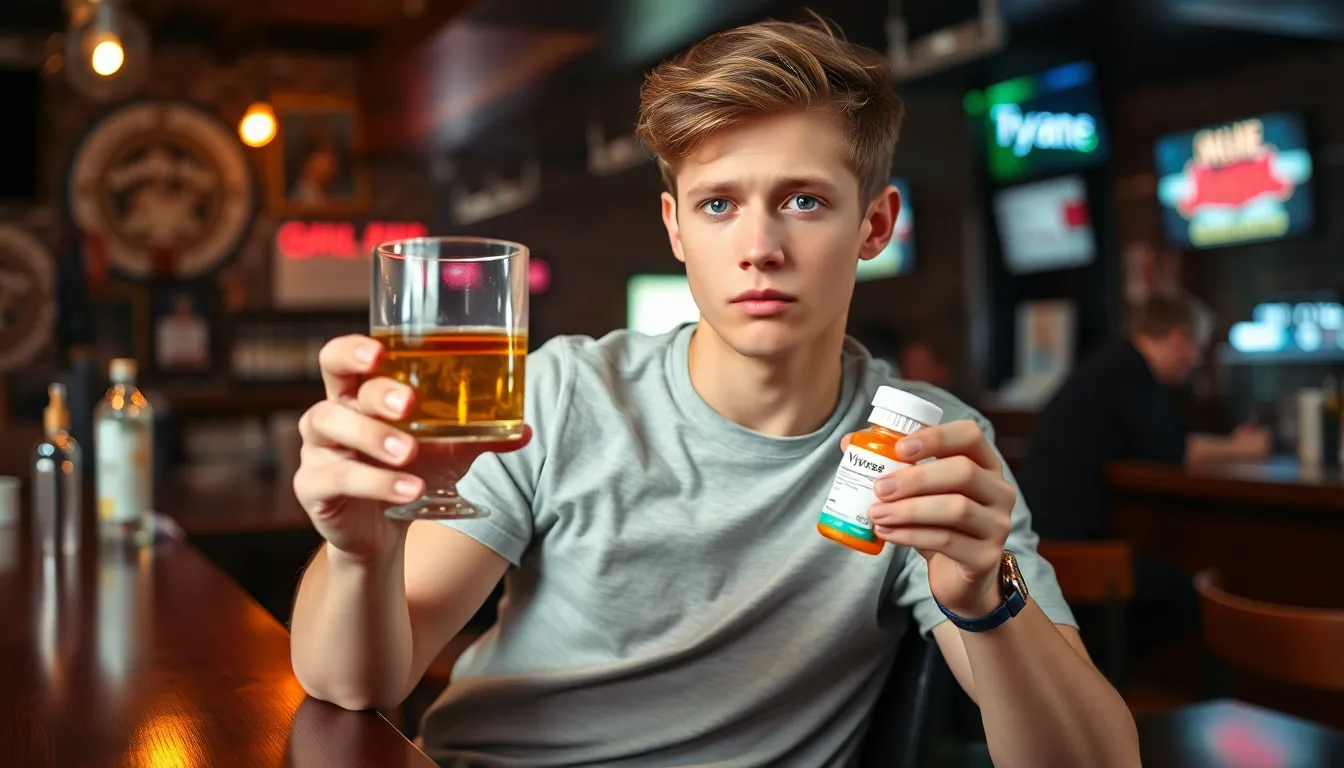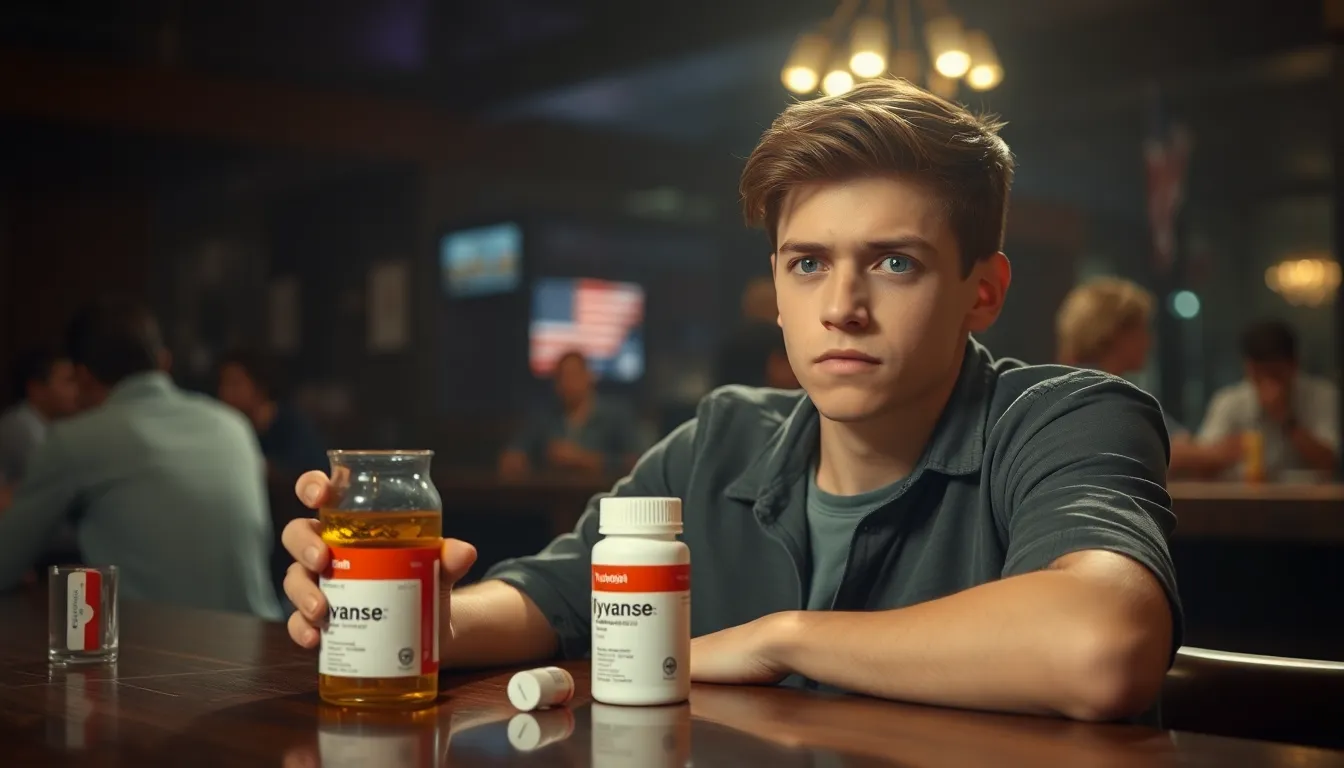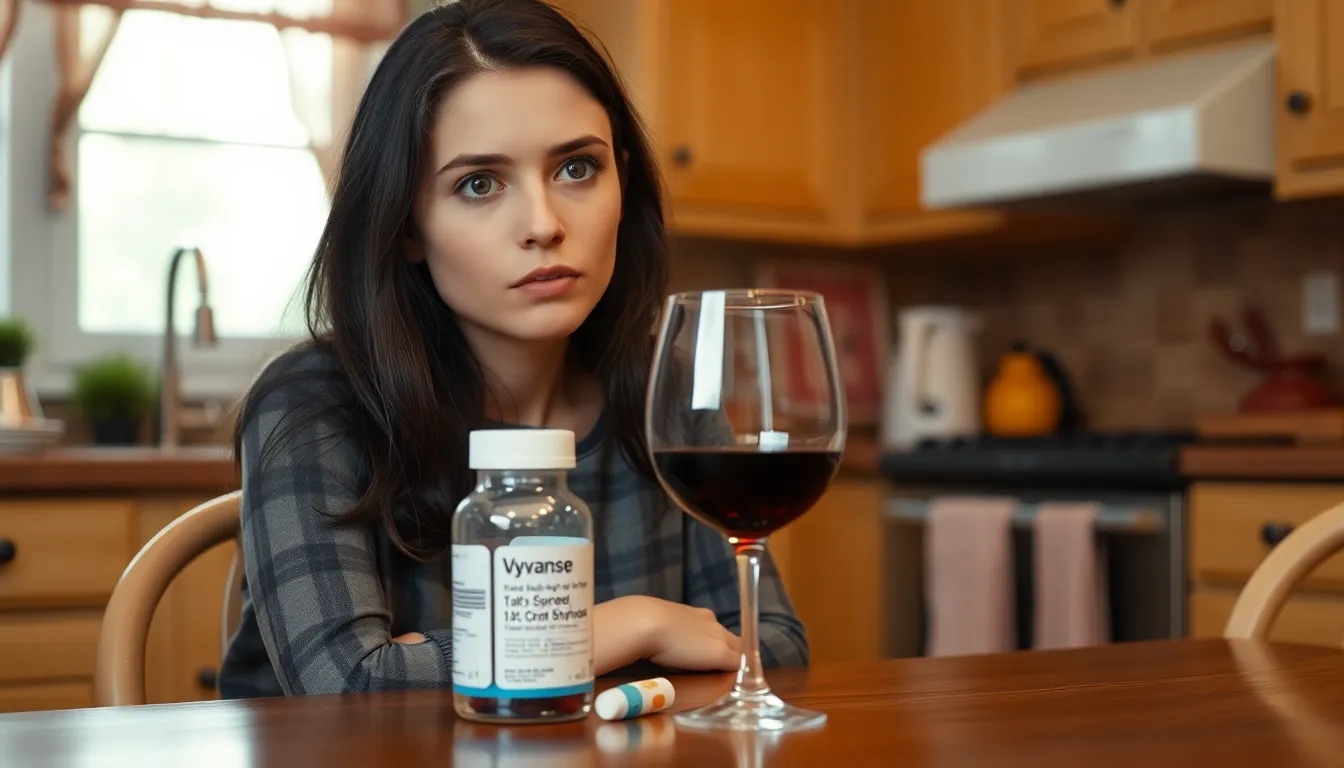Vyvanse is a popular medication prescribed for ADHD and binge eating disorder, known for its effectiveness in enhancing focus and controlling impulses. However, many people wonder about the safety of consuming alcohol while taking this stimulant. The combination of Vyvanse and alcohol can lead to unexpected effects, raising questions about potential risks and interactions.
Understanding how these substances interact is crucial for anyone on Vyvanse. Drinking alcohol can mask the medication’s effects, potentially leading to increased consumption and dangerous situations. It’s essential to explore the implications of mixing these two to ensure safety and well-being. This article delves into the relationship between Vyvanse and alcohol, providing valuable insights for those navigating this complex issue.
Table of Contents
ToggleUnderstanding Vyvanse
Vyvanse, also known as lisdexamfetamine, is a prescription medication mainly used to treat Attention Deficit Hyperactivity Disorder (ADHD) and binge eating disorder. It’s essential to understand its mechanism and effects to navigate potential interactions with substances like alcohol.
What Is Vyvanse?
Vyvanse is a central nervous system stimulant approved by the FDA for ADHD and binge eating disorder management. As a prodrug, it converts into its active form, dextroamphetamine, once ingested. This formulation enhances safety by reducing the potential for misuse, providing a controlled release of the medication throughout the day.
How Vyvanse Works
Vyvanse improves focus and impulse control by increasing neurotransmitter levels, particularly dopamine and norepinephrine, in the brain. These chemicals play significant roles in attention and behavior regulation. Vyvanse’s gradual release mechanism means it effectively maintains therapeutic effects, helping individuals manage symptoms over an extended period. The duration of action typically spans 10 to 14 hours, enabling users to function effectively throughout their daily activities.
The Effects of Alcohol


Alcohol can significantly influence how the body responds to medications like Vyvanse. Understanding these effects is crucial for individuals considering alcohol consumption while on Vyvanse.
How Alcohol Affects the Body
Alcohol depresses the central nervous system, leading to reduced coordination, impaired judgment, and slowed reaction times. These effects can overshadow the stimulating qualities of Vyvanse, which enhances focus and attention. As a central nervous system stimulant, Vyvanse may counteract some sedative effects of alcohol, creating a false sense of security. This imbalance can lead to the consumption of larger quantities of alcohol, increasing risks for adverse effects.
Potential Risks of Mixing Alcohol and Vyvanse
Mixing alcohol and Vyvanse poses several risks, including increased heart rate, elevated blood pressure, and heightened chances of anxiety or agitation. The stimulant effect of Vyvanse may mask alcohol’s intoxicating effects, resulting in potential overconsumption. Individuals mixing these substances may risk dehydration or alcohol poisoning due to the inability to recognize their intoxication level. Long-term, this combination might lead to increased dependence on substances and exacerbate mental health issues. By understanding these risks, individuals can make informed choices regarding their health and medication usage.
Is It Safe to Drink on Vyvanse?
Drinking alcohol while taking Vyvanse raises several safety concerns. The potential for adverse interactions requires careful consideration.
Medical Perspectives
Healthcare professionals often advise against mixing alcohol with Vyvanse. Alcohol potentiates the central nervous system’s depressant effects, counteracting the stimulant properties of Vyvanse. This combination can lead to increased heart rate and blood pressure, which may pose serious health risks. Medical studies indicate that patients may experience heightened anxiety or agitation when combining these substances. In some cases, the stimulant effects of Vyvanse may mask the signs of alcohol intoxication, increasing the likelihood of alcohol overconsumption and resulting in serious health complications.
User Experiences
User experiences with combining Vyvanse and alcohol vary, but many report negative consequences. Users commonly describe incidents of reduced coordination and impaired judgment while drinking on Vyvanse. Some individuals note that they felt a false sense of security, leading to increased alcohol intake. Reports of dehydration and hangover severity also appear more pronounced among those using both substances. Regular users indicate that long-term mixing could exacerbate anxiety or other mental health issues. Thus, individual experiences underscore the potential dangers involved with this combination.
Recommendations for Vyvanse Users
Vyvanse users should approach alcohol consumption with caution due to the potential risks associated with this combination. Understanding guidelines and exploring alternative strategies can help maintain health and well-being.
Alcohol Consumption Guidelines
- Avoid Mixing: Avoid consuming alcohol while taking Vyvanse. This combination can lead to dangerous health consequences, including increased heart rate and elevated blood pressure.
- Consult Healthcare Providers: Consult with a healthcare provider for personalized advice regarding alcohol consumption while taking Vyvanse. Professional guidance can clarify risks based on individual health conditions.
- Monitor Symptoms: Monitor for any unusual symptoms like heightened anxiety or agitation when considering alcohol. Awareness of personal reactions can inform safer choices.
- Limit Alcohol Intake: If alcohol consumption occurs, limit intake to small amounts. Staying within recommended guidelines significantly reduces health risks.
- Stay Hydrated: Ensure adequate hydration when consuming alcohol, as the combined effects may lead to dehydration. Maintaining hydration supports overall health.
Alternative Coping Strategies
- Engage in Physical Activity: Engaging in regular physical activity helps improve mood and reduce stress. Exercise serves as a productive outlet for energy and anxiety.
- Practice Mindfulness: Practicing mindfulness techniques, such as meditation or deep breathing exercises, promotes relaxation and focus, offering an effective alternative to alcohol.
- Connect with Support Networks: Connect with friends, family, or support groups to share experiences and seek guidance. Social interactions provide emotional support and help mitigate feelings of isolation.
- Explore Hobbies: Exploring hobbies or creative outlets diverts attention away from stressors and minimizes the urge to consume alcohol. Pursuing passions foster personal satisfaction and fulfillment.
- Establish Healthy Routines: Establishing consistent daily routines enhances structure and helps manage symptoms. Adhering to a regular schedule can lead to improved focus and emotional well-being.
Navigating the use of Vyvanse while considering alcohol consumption requires careful thought. The potential risks associated with mixing these substances can significantly impact one’s health and well-being. It’s crucial for individuals to recognize that the stimulating effects of Vyvanse may mask alcohol’s depressant qualities, leading to hazardous situations.
Prioritizing safety and health is essential. Consulting healthcare professionals for personalized guidance can help users make informed decisions. By exploring healthier coping strategies and maintaining open communication with providers, individuals can better manage their ADHD or binge eating disorder without compromising their safety. Making wise choices regarding alcohol can lead to improved overall health and a more balanced lifestyle.

